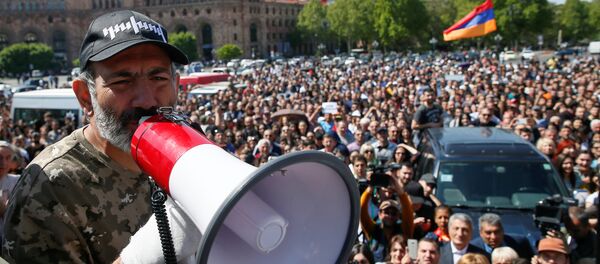"Representatives of the party will not be members of the government. … From now on, we are an opposition party," Eduard Sharmazanov, the deputy speaker of the parliament and member of the Republican Party's executive body, said on Tuesday.
Nikol Pashinyan has been elected Armenia's prime minister in the second round of voting in the country's parliament, the National Assembly, with 59 lawmakers giving their ballots for his candidacy and 42 voting against him.
READ MORE: Armenian Opposition Leader Invites System of a Down's Tankian to Move to Armenia
On May 1, the first vote in the Armenian parliament failed, since the only candidate, opposition leader Nikol Pashinyan, received only 45 votes out of the required 53. Under Armenian law, the parliament has to elect a prime minister a week after the first attempt of the vote, otherwise the legislature will automatically be dissolved.
READ MORE: Armenian Protesters Blocking Central Streets, Roadways in Yerevan — Reports
In the wake of the vote, people took to the streets of Armenia's capital Erevan to hold a rally.
A few days later, the opposition announced the beginning of a "velvet revolution," but the parliament nevertheless elected Sargsyan as the head of the government. However, less than a week later, he resigned amid continuing protests.
The backlash against his rule was triggered after Sargsyan, who served as Armenia's president from 2008, stepped down when his term ended, but was subsequently nominated for the premiership, which has largely been viewed as an attempt to stay in power as a newly amended constitution transferred some of the presidential powers to the head of the government.




